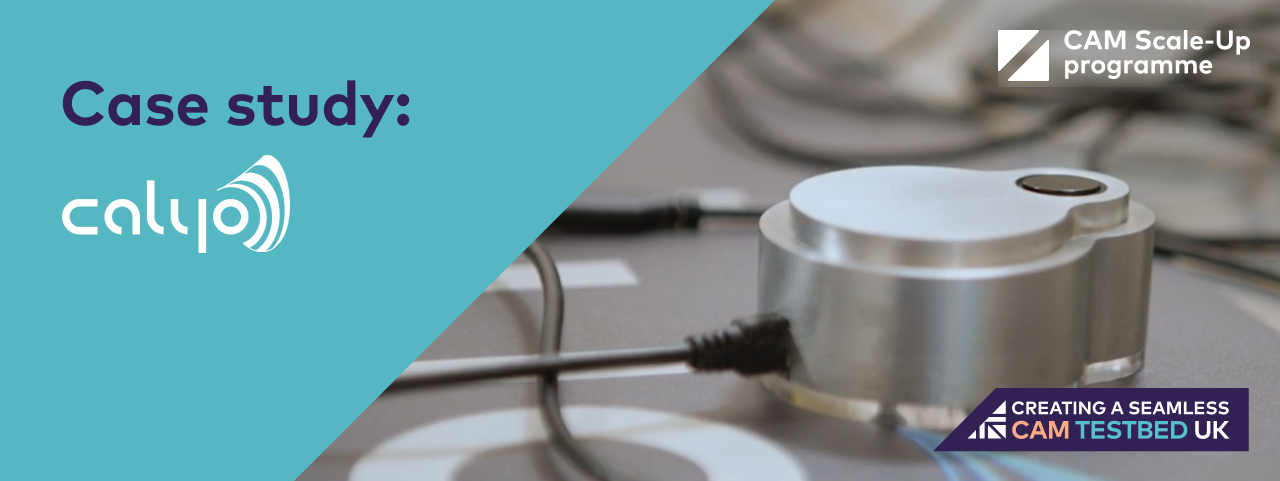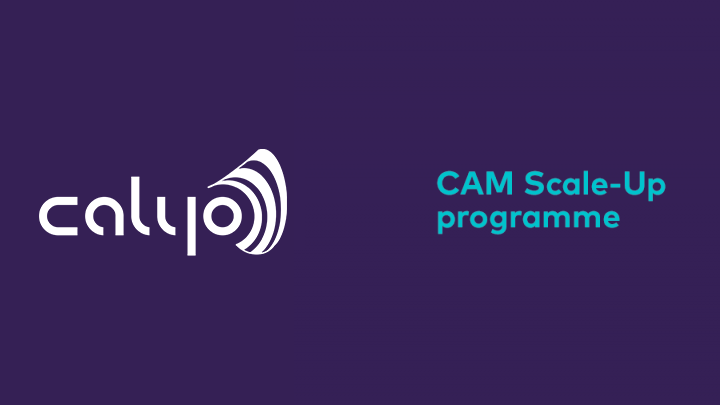



Calyo and the Zenzic CAM Scale-Up programme
Utilising deep-ultrasound technology to revolutionise the sensor-enabled mobility industry

Calyo is leading the way in the connected and automated mobility (CAM) space with its ground-breaking 3-D ultrasound sensor. The 3-D ultrasound collision prevention technology provides a solution to the safety gap created by adverse weather conditions that can hinder the performance of traditional radar and optical sensors.
The next level of autonomy requires safe and reliable management of unexpected scenarios and edge cases, and the company is addressing this crucial need with its compact and cost-effective solution. Calyo’s 3-D ultrasound sensor is ultralow size, weight, power and cost, and provides reliable imaging performance even in conditions where other technologies such as LiDAR, radar and cameras fail.
This innovative technology can be installed on a variety of vehicles and platforms, including industrial vehicles, mining vehicles, shuttles, last-mile delivery vehicles and drones, making it a versatile solution for a range of industries. As the world moves towards full autonomy, the company is poised to play a key role in “filling the safety gaps” in current sensing technologies and paving the way for a safer and more reliable future.
Calyo was founded in August 2020 by Dr Mihai Caleap with a vision to bring together the future of ultrasound and autonomy to create a safer and more efficient autonomous mobility experience for all. Calyo has established a robust and diversified network of partners, including Zenzic, who have played a crucial role in validating their technology.
What makes Calyo special?
Dr Mihai Caleap, Founder and CEO of Calyo, explains:
There are quite a few differences between Calyo’s ultrasonic sensor and existing solutions. Beyond our primary aim to close the safety gap of radar and LiDAR, we also offer an enhanced version of the standard ultrasound parking sensor. Our ultrasonic sensor has the capability to see the surroundings in 3D, which is a much more comprehensive view. This means, comparing it with existing sensors on a vehicle, fewer parking sensors are needed which provides further cost benefits for car manufacturers.”
With a range of up to 20 meters, Calyo’s sensor technology is well suited for deployment alongside radar and LiDAR sensors, adding an additional layer of vision for mobile robots and autonomous systems. It provides a cost-effective, “belt and braces” solution for CAM industry and is likely to be of great interest to original equipment manufacturers (OEMs) and automakers who have already invested heavily in LiDAR-based sensor solutions.
Calyo’s testing journey
Demonstrating their sensor’s capabilities even in the harshest environments through CAM Testbed UK

Calyo’s sensing technology has been subjected to rigorous testing to ensure the technology is fail-proof and to explore its limitations for further design and development. The company gained access to an open architecture vehicle at Culham Science Centre, which was equipped with various sensors such as LiDAR, radar, and stereo-vision cameras. In collaboration with UTAC Millbrook proving ground, Calyo tested their sensor in different environments, including rain sheds and fog rooms, to ensure its effectiveness in adverse weather conditions. Furthermore, Calyo’s 3-D ultrasound sensor has been benchmarked against LiDAR and radar, providing valuable insights into the performance of different sensing technologies.
Moreover, Calyo’s sensors underwent EMC testing at UTAC Linas-Montlhéry and NVH testing at UTAC Leyland, the latter being intensive, consisting of 95 hours of road load vibrations, 120 hours of combined environmental tests, and 240 hours of salt spray exposure.
The results of Calyo’s testing have been outstanding, with their sensor technology performing well in adverse weather conditions and demonstrating exceptional resistance to environmental factors. According to Dr Caleap, “Our rigorous testing program has been crucial to ensuring the reliability and effectiveness of our sensor technology. These tests have enabled us to fine-tune our technology and build confidence in its ability to deliver accurate and reliable data in any environment. We are excited about the potential of our sensor technology to drive innovation and enhance safety in the autonomous mobility industry.”
“The future of mobility is electric and autonomous, and Calyo is leading the way in ensuring the safety of passengers, pedestrians and other road users,” added Dr Caleap. “Our 3-D ultrasonic sensor is a key component in the evolution of safe and efficient autonomous vehicles, and we’re proud to be a part of this exciting journey.”
What would success look like?
In the near future, Calyo seeks to secure substantial investment to advance and commercialise their technology. In addition, they are aiming to establish key partnerships with industry leaders to expedite market penetration and explore licensing prospects to broaden their reach and impact. Ultimately, success for Calyo means their technology becoming a critical element in advancing autonomous mobility, ultimately resulting in safer and more efficient transportation for all.
Programme results
Calyo’s testing programme has resulted in business success across three core aspects.Technical assurance
Calyo now has the data to demonstrate the benefit of 3D ultrasound sensors in comparison to alternatives to investors and industry partners.
Safety
Access to CAM Testbed UK has enabled Calyo to prove that their solution provides an additional layer of safety to a vehicle.
Credibility
By taking part in the Zenzic CAM Scale-Up programme and testing their product, Calyo has gained greater legitimacy within the industry.
More SME case studies

Connected Collision Management Platform empowering Automotive organisations to deliver transformational customer and claims experiences

High density urban passenger & freight transport at half the cost/space/time and highest passenger convenience

Eloy is a connected and autonomous vehicle software business focused on multi-vehicle coordination. Our software includes patent pending methods for orchestrating how human-driven and autonomous vehicles travel.

Leading the way in road scape and highways information.

Breakthrough Radar Vision for Autonomy

PolyChord is a spinout from Cambridge University Astrophysics with uniquely powerful data science technology.
Find out more about the
CAM Scale-Up programme
discover more

Talk to us
Want to talk about connected and automated mobility in the UK and see how Zenzic can help you?
{{ teamMember.name }}
{{ teamMember.title }}
